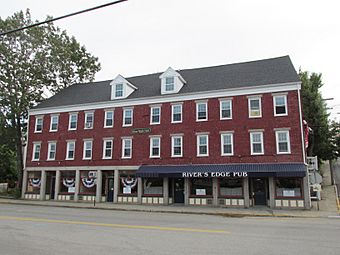Dudley Block facts for kids
|
Dudley Block
|
|
|
U.S. Historic district
Contributing property |
|

The Dudley Block in 2013
|
|
| Location | 28-34 Water St., Biddeford, Maine |
|---|---|
| Area | 0.3 acres (0.12 ha) |
| Built | 1848 |
| Architectural style | Greek Revival |
| Part of | Biddeford Main Street Historic District (ID09001146) |
| NRHP reference No. | 82000428 |
Quick facts for kids Significant dates |
|
| Added to NRHP | November 12, 1982 |
| Designated CP | December 24, 2009 |
The Dudley Block is a very old and important building in downtown Biddeford, Maine. It was built in 1848 and has been used for both shops and homes. This building is a great example of a style called Greek Revival architecture. It was added to the National Register of Historic Places in 1982. This means it's recognized as a special historical place. Later, in 2009, it became part of the larger Biddeford Main Street Historic District.
What is the Dudley Block?
The Dudley Block is located on Water Street in Biddeford. It sits across from Mechanics Park, not far from the city's main street. This building is three and a half stories tall.
Building Design and Features
The first floor of the Dudley Block has spaces for businesses. These shop fronts are separated by strong granite pillars. The top two floors are made of brick. They have many windows, each with a granite top. The roof has a pointed shape, called a gable, with two small windows sticking out. People living on the upper floors can enter through doors on the south side of the building.
History of the Dudley Block
Benjamin Dudley built this block in 1848. At that time, it was right across from the city's busy docks. The land where it stands had been used for businesses before. Dudley built this block as part of a plan to offer services and homes. These were for people working in the nearby mills and along the waterfront.
In 1864, Benjamin Dudley sold the building. It was bought by a group that included his son-in-law, Abel Jellison. Abel Jellison was a well-known person in Biddeford during the late 1800s. He served as a city leader and also in the state government.



